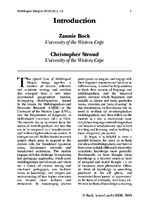| dc.description.abstract | This Special Issue of Multilingual
Margins brings together a
number of creative, reflective
and academic writings and artefacts
that emerged from a new interinstitutional
postgraduate module,
Re-imagining Multilingualisms, hosted
by the Centre for Multilingualism and
Diversities Research (CMDR) at the
University of the Western Cape (UWC),
and the Department of Linguistics at
Stellenbosch University (SU) in 2018.
The module has as its central focus the
notion of ‘multilingualism’ and how this
can be ‘re-imagined’ as a ‘transformative
tool’ within a higher education context. It
emerged out of a Mellon-funded research
project which seeks to respond to the
current calls for broadened epistemic
access, decolonised curricula and
transformed institutions. The module
engages with this challenge by exploring
how pedagogic approaches, which centre
multilingualism and diversity, and which
use a variety of creative writing and
arts-based pedagogies, can facilitate
access to knowledge, and deepen our
understanding of how higher education
can become more inclusive and
democratic. By encouraging student
participants to imagine and engage with
their linguistic resources and histories in
different ways, it aimed to help students
re-think their notions of language and
multilingualism, and the historical
power relations which legitimate and
amplify, or silence and mute, particular
voices, identities and ‘ways of seeing’. In
this introduction, we first discuss why we
need to re-think (or re-conceptualise)
multilingualism, and then reflect on the
module as a way to understand more
deeply how language and multilingualism
can become a transformative tool in both
teaching and learning, and in building a
more integrated, just society. | en_US |

